Suzanne Hawkins talks to Elaine Hudson, the admired Australian actress, who is rehearsing her role as Peer's mother, Aase, in Endangered Productions performance of Peer Gynt in June/July 2022. Elaine speaks about researching a role, Ibsen, the play, and her rich, varied, career spanning many continents, with the poise of a veteran actress who has a deep knowledge of her industry.
Read Elaine's bio here.
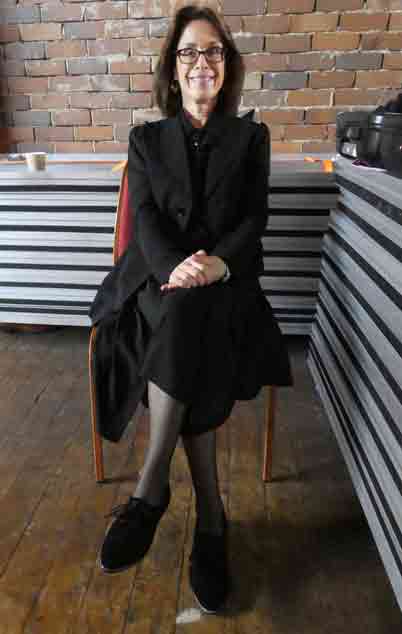
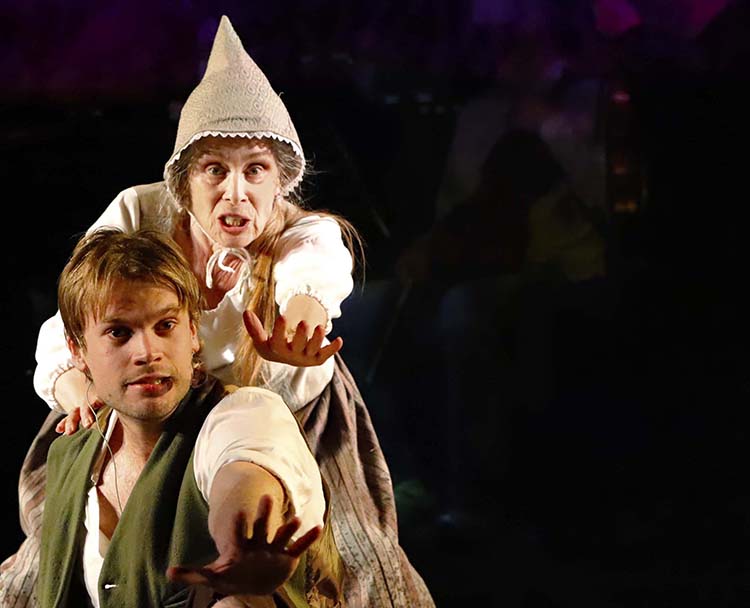
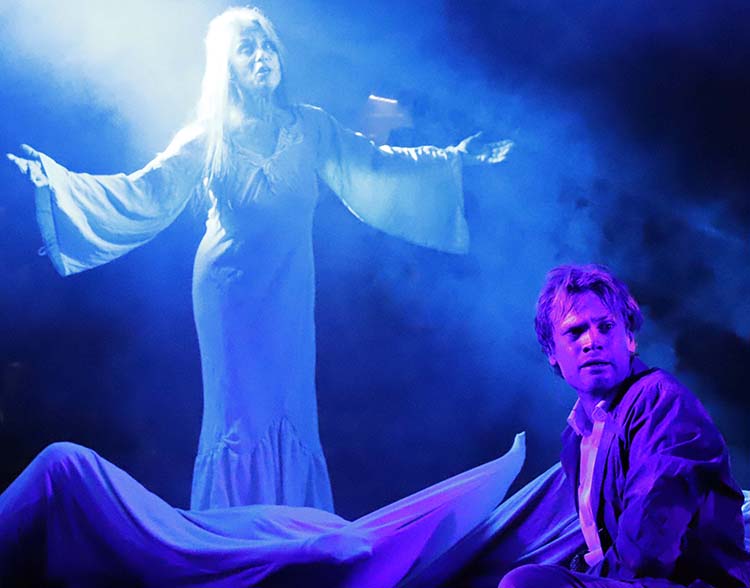
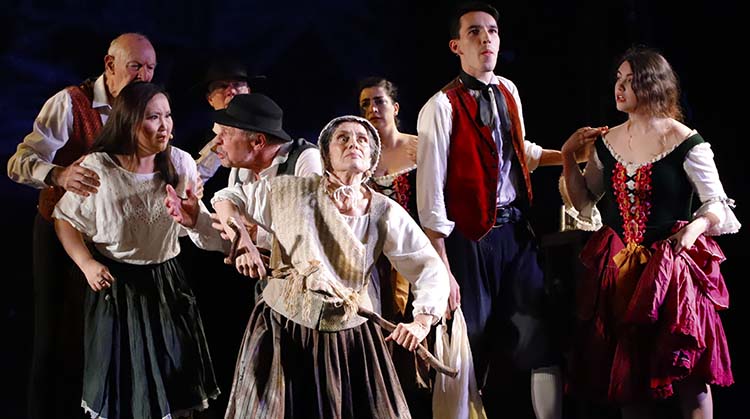
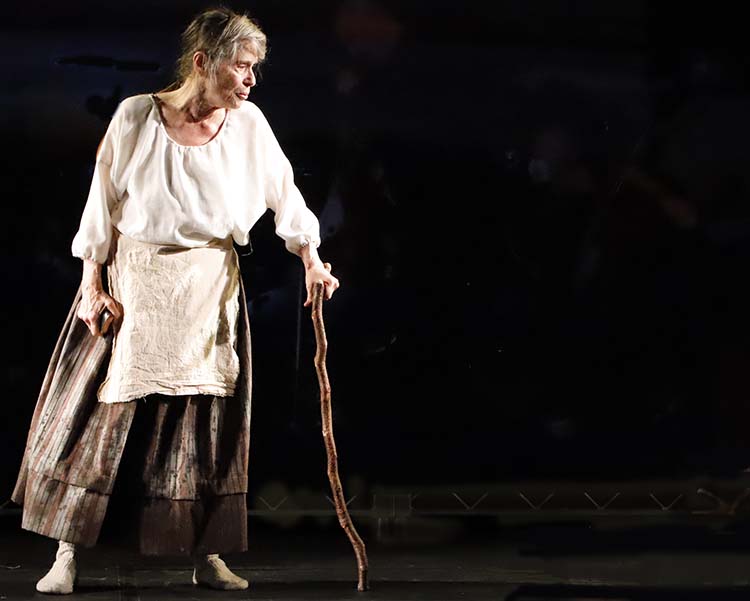
Suzanne and Elaine sit together for a chat. Elaine’s well-thumbed copy of Ibsen’s mammoth biography sits next to them.
How did you become involved in Peer Gynt? Christine (Logan, Artistic Director) approached me. Although we had never met, we had mutual friends in the theatre world.
Had you heard of Endangered Productions? Yes. I'd read a good review in the Sydney Morning Herald about their production Nordic Noir. I also saw Double Trouble at Customs House. It is an interesting Company to work with - for me - as so many of the Company members are also singers and musicians.
There is a lot of interest in this Peer Gynt, as it hasn't been done in Sydney since the ‘70s. I think the play is fun. Peer is such a wacky, wild character. It is a comedy with a lot of laughs. There is also a madness and a pathological wildness to the play. With only four performances, it will probably be sold out. Paddington RSL is a pretty funky venue for Henrik Ibsen!
What do you find special about this play? Peer Gynt is one of his greatest works and the one that made him. I've been in two of Ibsen’s plays before this: Ghosts, a great scandal-provoking play about a mother and her syphilitic son at the Q Theatre Penrith and A Doll’s House at the Sydney Theatre Company (STC).
I’m discovering in Ibsen’s biography that Peer is very like Ibsen. He’s a completely crazed, contradictory, bewildering and violent being, who drinks a lot and blames alcohol for his behaviour. Peer has no answers, just endless questions. He can be cruel. For instance, he puts his mother on the roof and says to Solveig (his love) “I’ll drain your blood into a cup”. But then he also has a very shy side, such as when he shows reluctance to ask the town girls to dance with him. Like Ibsen, most people can’t help but be attracted to Peer, but they are also repelled by him. Ibsen probably felt attracted and repelled by the Peer in himself. I feel I have to add that Ibsen was also highly disciplined – hence his enormously thrilling and influential body of work.
What impact does all of this have on you in the role of Peer’s mother? Aase adores Peer. He's her only son. She shares his sense of the fantastic, which he inherited from her. For example, in the scene when Aase is dying, she asks, “Remember how we used to play at sleighs and the floor would become an icebound fjord?”. Most parents fantasise for their children, as kids love stories. I know, I did. However, Peer takes his (storytelling) to the extreme. Ibsen, too, had a compulsion to tell stories. Storytelling was his life.
You are learning about Peer Gynt in some depth! It's always fun to research. I read a lot and I have a huge theatre library. But when you get on stage, you just put it all behind you. And whatever remains, remains. You don't go on with the research in your head; that would be a nightmare. It’s amazing what stays and what you forget. That's the alchemy of a performance. It's a creative art.
How are you playing your character Aase? It's early days in rehearsals. You discover things as you go. I studied with the great Australian mezzosoprano, Florence Taylor, and she said something that stayed with me - that something must be part of you before you can give it away. It is an advantage too, having worked before with Philipe (Klaus who plays Peer). There’s a trust, respect, and relaxation about the relationship.
What were you doing prior to Peer Gynt? A wonderful play called Mum, Me and the IED at the Depot Theatre directed by Kevin Jackson. That’s where I first met Philipe. I played his mother. We had a big connection through the play’s poetry and he was wonderful to work with. It's a real thrill to be working with him again.
You've had a rich history in theatre and film. Thank you. After starting a BA at NSW Uni, I auditioned for NIDA. I got in, and adored it! I missed doing French but returned to that later. As a side note, Peer Gynt was an important part of NIDA history. Kevin Jackson played Peer in the final scenes in a production they were still talking about it when I arrived four years later! It was five hours long and was directed by my great NIDA acting teacher, Alexander Hay. The respected director and teacher, Aubrey Mellor, who is advising the Artistic Director, Christine on our Peer Gynt, has never forgotten that production.
After NIDA, I was employed by the Old Tote, the precursor to the STC, and later joined Q Theatre, Penrith. Performing in the evening and rehearsing the upcoming play in the day. Wonderful!
I returned to the STC for its inaugural season where I played Grusha in the Jane Street production of The Caucasian Chalk Circle directed by John Clark. I worked with STC again in The Crucible for two seasons at the Opera House. It was a wonderful production directed by Richard Wherrett with John Howard playing Proctor. I played Elizabeth Proctor. I worked with Richard again on Justin Fleming’s Burnt Piano for Company B. Over the last few years it’s been a joy for me to have worked on new texts with Rivka Hartman. It's thrilling doing classics, then new works. It reminds you that you're continuing a tradition.
With regard to film, my most recent was Rancour. Written and directed by Dane Hallett. I was the mother there too, a great experience, emotionally demanding but a joy.
After Peer Gynt, I'm doing a short film called Joe's Encyclopedia in Tokyo with Roger Pulvers. Roger is a brilliant translator as well as a wonderful writer and director. Thanks to Roger I got a chance in 2012 to work on a performance of Kenji Miyazawa’s poetry with Japanese actors and musicians. Since then, I go back to Japan whenever possible. I do love the theatre there – the Kabuki, the Noh and especially the Bunraku. Not only theatre: I have a favourite little bar in Kyoto, ‘The Turquoise Bar’, very beautiful, very quiet, where I always have a dry martini.
My company, 'Cumulus Productions', I formed in the late ‘90’s with Kevin Jackson and Liz Burton. We presented several productions including Mother Teresa is Dead and Women of Lockerbie. 'Queensize Productions' invited me to play Queen Elizabeth in Dacia Maraini’s Mary Stuart. After a season at Downstairs Belvoir, we went to the International Fringe Festival in New York. This in turn led to Teatro Cortile in Bolzano, a beautiful theatre, where I co-devised and acted in a one-woman show inspired by the life and poetry of Emily Dickinson.
Did you come from an ‘arts family’? I grew up on the Northern beaches, one of seven children. Six boys, one girl. No actors, apart from me. My parents were very supportive. Mum, who is 94, is always interested in hearing about the plays and the people I'm working with – perhaps her Irish background and two close cousins in musicals. Mum’s cousin was a close friend of Peter Kenna. Mum always sends flowers on opening night no matter where I am. When I did A Streetcar Named Desire directed for the STC by Liv Ullmann, the great Norwegian actress, I played the Strange Woman who comes on for the final tumultuous scene, Mum from North Curl Curl, managed to get the flowers to BAM, Brooklyn on the opening night!
Any last words about Peer Gynt?
I’m glad I’m doing Peer Gynt and I'm curious to see how we get there. Of course, Peer never gets there. That's the irony of the play. He leaves, he has adventures, and he returns to Solveig. But ''Is that the end?" one asks. It may not be. The mysterious Button Moulder says, “We shall meet at the last crossroads Peer, and then we shall see. I'll say no more”. Ibsen was a great one for keeping things open. As he famously said, a dramatist’s business is not to answer questions, but only to ask them.
I like questions as an actor. I love question marks. If you can answer them, good. If you can't, well, you can't.
